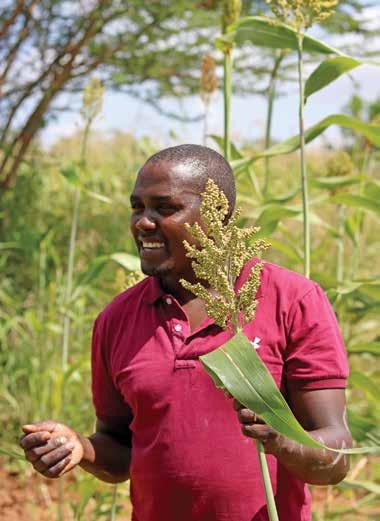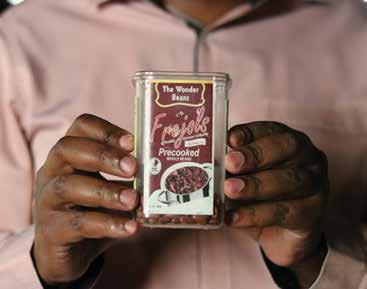
6 minute read
Business to benefit the community
Smart Logistics founder Rose Mutuku discusses her company with a visiting MEDA group
Kenyan woman works to raise farmers’ income
Rose Mutuku has always wanted to give back to her community by helping farmers in her region.
Growing up in a difficult area of Kenya where she had to walk more than six miles to fetch a litre of water, she knew well the struggles of small scale farmers in her region.
Through the work of her company, Smart Logistics, and the training the firm has provided to her farmer suppliers, she has contributed to major improvements in their lives.
“We’ve seen farmers move from grass hut homes, within three years, into very nice homes, because of the amount of money that we have paid,” she recalled during a presentation to a visiting MEDA group earlier this year.
Early in her career, she worked for East African breweries as a supply chain manager.
Photos by Krista O’Brien
While working there, sorghum became a raw material for the brewery. Rose felt sorghum could be grown in her region. She resigned from the brewery to promote sorghum within the community, starting Smart Logistics in 2009.
“As I went into the market, I realized there are so much other things I can do.”
She started introducing a number of other crops and com
mercializing them.
Up until 2015, Smart Logistics was buying sorghum for other companies as an aggregator or trader.
That year, the government hit the brewery with an excise tax for one of their brands that was using sorghum.
Mutuku saw a big gap in the value chain she was working with. The brewery quit producing the brand and buying the sorghum. “I didn’t know what to do.”
“God was good at that time… my mind started running around and I was now thinking, what else can we do?”
One day while doing housecleaning, she saw a plate of beans under her son’s bed. She removed the leftovers from a meal that consisted of a mix of beans and maize.
She put the plate, which was dried out from sitting for a period of days, on the kitchen counter, added some hot water and continued her cleaning. When she returned, she found a nutritious, fresh-smelling meal.
The notion of being able to recook dehydrated beans kept coming back to her.
She began cooking beans and trying to dry them “they burst out, they all became popcorn.”
Then she tried cooking them in a microwave and other methods but could not get them whole.
Eventually, she cooked the beans and just put them under a bed. “After awhile, they dried, and they were whole.”
Mutuku began studying the temperature of the room and was able to reproduce the conditions in her factory, using a heater and fans. “It was about 10 kilos, they worked.”
With that success, she packaged beans and gave them to friends, who liked the product and began ordering them. She could not keep up with the orders.
Initially, it was difficult for her to get financing for a woman-led business. “As a woman entrepreneur in Kenya, it’s very difficult. … (Banks) say you have no collateral; you can’t get financing.”
After lenders agreed to advance her some capital to put up a larger factory, she started producing beans in quantity. Smart Logistics has developed a number of other products including bean snacks, some done at her factory and some made elsewhere because she does not have enough machines.
MEDA became aware of Smart Logistics after staff memFarmer Paul Makau has seen great benefits from supplying ber Walter Tinega Smart Logistics. met Mutuku at an exhibition. He ing building a raised bed. thought the company could be“Some of the crops that we come a lead firm, providing trainare buying like sorghum, beans, ing and assistance to farmers. the pulses, were not commercial
“With MEDA, we’ve actually crops,” she said. “They were subbeen able to get more than 3,000 sidiary crops. But they are seeing farmers to supply us,” Mutuku an increase in production because said. “The farmers are very happy (their crops) are going to a factory.” because they know where they are Since receiving $80,000 in taking their products.” support from MEDA as a match
MEDA’s support helps financiers ing grant, SL has expanded from to believe in the company, she said. one to six product lines, includ
MEDA’s financial support ing: bean flours that women use to allowed Smart Logistics to start agmake soups, stews and thickeners gressively training farmers on qualfor meat dishes for their families, ity, aggregation and conservation and a bean snack that combines agriculture, as well as providing beans with sorghum and a bit of crop insurance and connections to honey. (Mixed with milk, it turns financial institutions. That support into porridge that caregivers feed to also helped Mutuku to do product their children.) development and marketing. Mutuku has seen farmers
Smart Logistics’ training has improve their productivity, increase helped some farmers to add value their land holdings, and most sigto the products that they supply. nificantly for her, women farmers Staff help farmers find innovative being paid directly. ways to dry their products, includSome farmers, who had not

previously earned $100, have earned $30,000 in a season since they started supplying Smart Logistics, she said.
Bank accounts were a new idea for some of those farmers. Mutuku recalls one farmer asking not to be paid until he could be told what to do with the money. Others did not understand how to make withdrawals.
“It’s quite exciting to see all the transformation that’s been happening to farmers, especially within the period of time that we have been supported by MEDA to operate.”
One such farmer, Paul Makau, owns one acre of land on which he grazes his dairy cows and rents another four acres for growing sorghum. “I’ve really improved my income here,” he said of sell

ing to Smart Logistics over the past three years.
Smart Logistics has also created employment for youth. They have bought motorbikes and travel around working as aggregators. The company has increased its staff from 13 to 21 since they began working with MEDA.
Sales have increased and now the company has added farmers to its value chain without even having to recruit. “They knock on the door,

which is a nice thing.” Initially, Mutuku’s husband was not supportive of her running a company. “But with time, as he saw what is coming up, now he is a great supporter of the business.” Her husband works in a government job and sits on the company’s board, offering ideas. Her son is employed by the firm.
As with many businesses, challenges remain. Smart Logistics did not have enough raw material to run the factory in January due to drought last year. Heavier rains in early 2020 have made it difficult to dry materials.
Even when the weather cooperates, the company cannot meet all of its orders without expanding its production capacity. w



